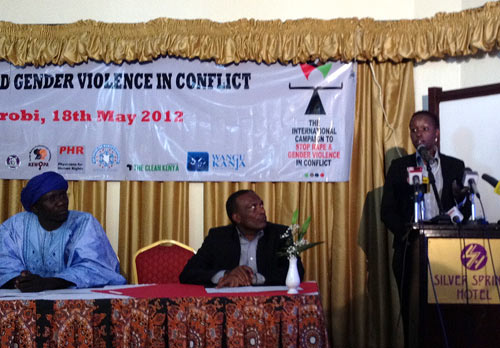PHR, working with colleagues at Panzi Hospital in Bukavu, eastern Congo, and in collaboration with the Nobel Women’s Initiative and many others, had the privilege of convening one of many events across the globe to launch a new civil society effort to stop address sexual violence in conflict zones.
The following summary comes from the new Coordinator in the Democratic Republic of Congo (DRC) of PHR’s Program on Sexual Violence in Conflict Zones, Caroline Dauber.
On May 11 at the Hotel Residence in Bukavu, 130 representatives of civil society organizations as well as individuals gathered to learn about the International Campaign to Stop Rape & Gender Violence in Conflict.
Women and men from various organizations addressed different facets of rape and gender violence. Aimée Birindwa (Programme de Secours au Vulnérables et Sinistrés) from Uvira, South Kivu, spoke of the psychological consequences for many survivors. Attorney Aline Biruru (Association des Femmes Avocates – Association of Women Lawyers) from Bukavu and James Songa (Lawyers Without Borders) also from Bukavu informed participants about fighting impunity. Doctor Denis Mukwege, Director of Panzi Hospital, encouraged the participants to put into effect solutions that address the root causes of the conflict in the DRC.
Following the speeches, those assembled debated the goal of the Campaign and its strategy. The discussion centered around three points taht we made repeatedly:
- First, rape and sexual violence are used as weapons to weaken the population, because a weakened population does not revolt.
- Second, rape and sexual violence is a consequence of the current general situation in the DRC – the rising tensions between economic and political actors who are trying to appropriate the resources of Eastern DRC to the detriment of the population.
- Third, it was emphasized that since military, political, economic, rebel, and international actors are responsible for the conflict, then it was unlikely that the solution will come from them, so the voices of civil society are vital.
Moreover, aid from the international community which has been delivered to Eastern DRC for the last 15 years has not yielded the desired results. As many international donors have strategic interest in the region, external funding and coordination mechanisms often prevent local initiatives from bringing about sustainable development. Participants strongly emphasized that much aid has gone to the consequences of the conflict, and not enough to address the root causes and the prevention of violence.
Everyone present agreed that visibility is a necessary tool to stop rape and gender violence, and that the Campaign will provide Congolese people with the necessary visibility and platform to take action.
More than 50 NGOs and dozens of individuals joined the Campaign. Needless to say the event was a success!

